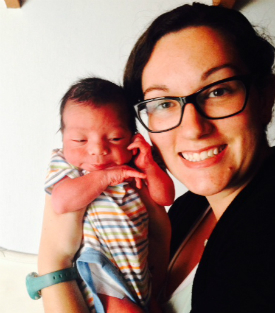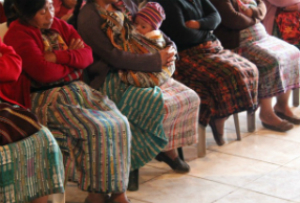
Why did you decide to go abroad with your provider?
Ivy: I had heard of Midwife International and later the Birth Institute years before I ever thought of signing up for one of their programs. I had always thought of their programs for the future, never having quite enough time for their year long program that they offered.
When I saw the 10 week program, my interest was peaked. I started asking questions, not sure yet if the opportunity was really right for me. Everyone that I spoke to within the Birth Institute community was so welcoming, helpful, and genuinely happy to answer my thousands of questions. I felt immediately like a part of the Birth Institute family. They even sent me a Christmas card!
The program they offered was well laid out, affordable, and unique. I knew that I would get continued support from the Birth Institute team, which I did. It was a fantastic decision!
What is one piece of advice you'd give future students traveling with your program?
Ivy: Immerse yourself in the culture, the language, and the experience. It is uncomfortable at first placing yourself into a situation so different than you are used to, but you get so much more out of the experience.
The clinic that we lived at during our time in Guatemala (where we were also able to observe appointments and births) is able to function with the help of four wonderful women. Only one of them speaks English. Don’t rely on her to translate for you. Learn the language, interact with everyone at the clinic, and make an effort to really learn all that you can.
Did you run into a language barrier? Did you ever think you knew more/less of the language?

Ivy: Guatemala is a Spanish speaking country. Outside of the touristy areas there are very few people that speak English. Only one of the women working at the clinic spoke English, and 98% of the clients that come to the clinic speak no English. That being said, there was of course a huge language barrier.
I arrived at the clinic grasping at my high school Spanish that I had not used since then, about 8 years. I was barely able to understand when someone introduced themselves to me.
By the end of the course (10 weeks), I was able to complete the appointments on my own, completely in Spanish. It was amazing to be able to carry on a conversation in another language. I started thinking in Spanish, dreaming in Spanish, and using more Spanish than English!
How has this experience impacted your future? (Personally, professionally, academically, etc)
Ivy: When I signed up for this course I thought that it would be a cool experience, and another country to add to my visited list. I work as a nurse so I have a medical background, and I had an interest in women’s health. I was planning that I would return to my nursing job once finished in Guatemala with cool stories to tell but really no change in my career path.
I was wrong. At the end of August I had the true pleasure of delivering my first baby. I had labored with the mom-to-be for hours. We were up all night together. She locked eyes with me during her contractions, and we laughed in between them.
Then, after 6 hours of intense pushing, I caught her baby and was the one to bring him up to her chest for the two to meet. All of a sudden I wasn’t just a nurse, I was a future midwife. My whole future changed. This experience has not merely ‘impacted’ my future. It has completely rewritten it.
Tell us about any interesting cultural tidbits you noticed about your country.
Ivy: Guatemala is a very unique country full of culture and tradition. The color red plays a very important role in pregnancy, birth, and care of the newborn. Pregnant women will often wear red underclothes, bracelets or strings around their bellies to ward off danger and to protect the fetus. After the baby is born, a red bracelet will be placed on the newborns wrist to protect it from illness and evil spirits.

The number of knots in the umbilical cord signifies the number of children that the mother will have. The number 40 also has a very high importance in the postpartum period. Some believe that the baby must remain covered for the first 40 days to protect it from evil spirits.
In the 40 days postpartum women are not allowed to lift anything in fear that their uterus will fall out, they do not shower or get wet as it is believed to be bad for milk production, and they do not complete any household duties. There are many more cultural traditions surrounding pregnancy and birth, and so many more in day to day life. It is a beautiful and unique country!